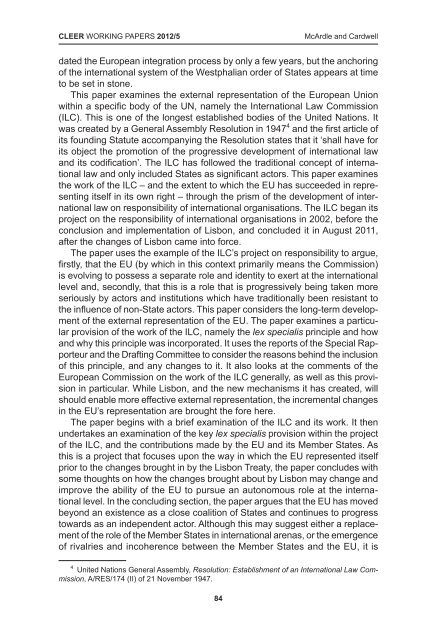CLEER WORKING PAPERS 2012/5McArdle <strong>and</strong> Cardwelldated the European integration process by only a few years, but the anchoring<strong>of</strong> the international system <strong>of</strong> the Westphalian order <strong>of</strong> States appears at timeto be set in stone.This paper examines the <strong>external</strong> <strong>representation</strong> <strong>of</strong> the European Unionwithin a specific body <strong>of</strong> the UN, namely the International Law Commission(ILC). This is one <strong>of</strong> the longest established bodies <strong>of</strong> the United Nations. Itwas created by a General Assembly Resolution in 1947 4 <strong>and</strong> the first article <strong>of</strong>its founding Statute accompanying the Resolution states that it ‘shall have forits object the promotion <strong>of</strong> the progressive development <strong>of</strong> international law<strong>and</strong> its codification’. The ILC has followed the traditional concept <strong>of</strong> internationallaw <strong>and</strong> only included States as significant actors. This paper examinesthe work <strong>of</strong> the ILC – <strong>and</strong> the extent to which the <strong>EU</strong> has succeeded in representingitself in its own right – through the prism <strong>of</strong> the development <strong>of</strong> internationallaw on responsibility <strong>of</strong> international organisations. The ILC began itsproject on the responsibility <strong>of</strong> international organisations in 2002, before theconclusion <strong>and</strong> implementation <strong>of</strong> Lisbon, <strong>and</strong> concluded it in August 2011,after the changes <strong>of</strong> Lisbon came into force.The paper uses the example <strong>of</strong> the ILC’s project on responsibility to argue,firstly, that the <strong>EU</strong> (by which in this context primarily means the Commission)is evolving to possess a separate role <strong>and</strong> identity to exert at the internationallevel <strong>and</strong>, secondly, that this is a role that is progressively being taken moreseriously by actors <strong>and</strong> institutions which have traditionally been resistant tothe influence <strong>of</strong> non-State actors. This paper considers the long-term development<strong>of</strong> the <strong>external</strong> <strong>representation</strong> <strong>of</strong> the <strong>EU</strong>. The paper examines a particularprovision <strong>of</strong> the work <strong>of</strong> the ILC, namely the lex specialis principle <strong>and</strong> how<strong>and</strong> why this principle was incorporated. It uses the reports <strong>of</strong> the Special Rapporteur<strong>and</strong> the Drafting Committee to consider the reasons behind the inclusion<strong>of</strong> this principle, <strong>and</strong> any changes to it. It also looks at the comments <strong>of</strong> theEuropean Commission on the work <strong>of</strong> the ILC generally, as well as this provisionin particular. While Lisbon, <strong>and</strong> the new mechanisms it has created, willshould enable more effective <strong>external</strong> <strong>representation</strong>, the incremental changesin the <strong>EU</strong>’s <strong>representation</strong> are brought the fore here.The paper begins with a brief examination <strong>of</strong> the ILC <strong>and</strong> its work. It thenundertakes an examination <strong>of</strong> the key lex specialis provision within the project<strong>of</strong> the ILC, <strong>and</strong> the contributions made by the <strong>EU</strong> <strong>and</strong> its Member States. Asthis is a project that focuses upon the way in which the <strong>EU</strong> represented itselfprior to the changes brought in by the Lisbon Treaty, the paper concludes withsome thoughts on how the changes brought about by Lisbon may change <strong>and</strong>improve the ability <strong>of</strong> the <strong>EU</strong> to pursue an autonomous role at the internationallevel. In the concluding section, the paper argues that the <strong>EU</strong> has movedbeyond an existence as a close coalition <strong>of</strong> States <strong>and</strong> continues to progresstowards as an independent actor. Although this may suggest either a replacement<strong>of</strong> the role <strong>of</strong> the Member States in international arenas, or the emergence<strong>of</strong> rivalries <strong>and</strong> incoherence between the Member States <strong>and</strong> the <strong>EU</strong>, it is4 United Nations General Assembly, Resolution: Establishment <strong>of</strong> an International Law Commission,A/RES/174 (II) <strong>of</strong> 21 November 1947.84
The International Law Commission: An increasingly significant role for the <strong>EU</strong>?contended here that a ‘middle way’ has been found. Although the views <strong>of</strong> the<strong>EU</strong> as an independent actor <strong>and</strong> the Member States may on occasion differ,the latter are (at least in general sense) supportive <strong>of</strong> the progression towardsthe <strong>EU</strong> becoming more significant as an international actor. In the area surroundingthe ILC, at least, there has been a general acceptance <strong>of</strong> the <strong>EU</strong>voicing its opinions <strong>and</strong> in contributing to <strong>and</strong> helping to shape the development<strong>of</strong> international legal principles.2. The International Law Commission’s project on theResponsibility <strong>of</strong> International OrganisationsThe International Law Commission (ILC) is one <strong>of</strong> the longest established bodieswithin the UN system. It was established by a Resolution <strong>of</strong> the GeneralAssembly in 1947 <strong>and</strong> held its first session in 1949. 5 Much <strong>of</strong> international laworiginally had to be sought out in the form <strong>of</strong> customary principles. A number<strong>of</strong> ad hoc attempts at codification were made in the nineteenth century throughthe holding <strong>of</strong> conferences. 6 This was relatively limited, however, <strong>and</strong> whilethere was some attempt at codification made under the League <strong>of</strong> Nations,there was nothing comprehensive. 7 In the early days <strong>of</strong> the ILC’s work, accounthad to be taken <strong>of</strong> (generally) unwritten principles which had developed overtime, according to State practice accompanied by opinion juris, a concept meaningthat the practice is believed to be law. The establishment <strong>of</strong> the ILC thussignified a break from the past by a desire to work towards a codified, comprehensiveversion <strong>of</strong> law applying between States. The establishment <strong>of</strong> the ILCdrew on the various previous attempts at codification <strong>of</strong> principles, which hadoccurred in isolation at different congresses <strong>and</strong> conferences. 8One <strong>of</strong> the key challenges facing the ILC was that <strong>of</strong> establishing rules oninternational legal responsibility. This is a topic which had been on the agenda<strong>of</strong> an early attempt at codification with the Conference <strong>of</strong> the League <strong>of</strong> Nationsin 1930, but proved too sensitive. 9 The establishment <strong>of</strong> the ILC saw a revival<strong>of</strong> the questions surrounding this topic <strong>and</strong> it was included on the initial list <strong>of</strong>fourteen subjects for codification, adopted at the ILC’s first session in 1949. 105 United Nations General Assembly, Resolution: Establishment <strong>of</strong> an International Law Commission,A/RES/174 (II) <strong>of</strong> 21 November 1947; Report <strong>of</strong> the International Law Commission on thework <strong>of</strong> its first Session, 12 April 1949, Official Records <strong>of</strong> the General Assembly, Fourth Session,Supplement No. 10, Extract from the Yearbook <strong>of</strong> the International Law Commission 1949, vol.I.6 UN Documents on the Development <strong>and</strong> Codification <strong>of</strong> International Law, Supplement tothe American Journal <strong>of</strong> International Law Vol.41, No.8, Oct.1947, 32-49.7 Ibid, 49-61.8 United Nations Documents concerning the Development <strong>and</strong> Codification <strong>of</strong> InternationalLaw, Supplement to American Journal <strong>of</strong> International Law,41(4), October 1947; Final Act <strong>of</strong> theInternational Peace Conference. The Hague, 29 July 1899; Final Act <strong>of</strong> the Second Peace Conference,The Hague, 18 October 1907.9 A. Pellet, ‘The ILC’s Articles on State Responsibility for Internationally Wrongful Acts <strong>and</strong>Related Texts’, in J. Crawford, A. Pellet <strong>and</strong> S. Olleson (eds.) The Law <strong>of</strong> International Responsibility,Oxford: Oxford University Press, 2010, at 75.10 Report <strong>of</strong> the International Law Commission on the work <strong>of</strong> its first Session, 12 April 1949,Official Records <strong>of</strong> the General Assembly, Fourth Session, Supplement No. 10, Extract from the85CLEER WORKING PAPERS 2012/5
- Page 1:
Founded in 2008, the Centre for the
- Page 4 and 5:
CLEER WORKING PAPERS 2012/5Gosalbo
- Page 6 and 7:
CLEER WORKING PAPERS 2012/5Gosalbo
- Page 8 and 9:
CLEER WORKING PAPERS 2012/5Gosalbo
- Page 10 and 11:
CLEER WORKING PAPERS 2012/5Blockman
- Page 12 and 13:
CLEER WORKING PAPERS 2012/5Blockman
- Page 14 and 15:
CLEER WORKING PAPERS 2012/5Casolari
- Page 16 and 17:
CLEER WORKING PAPERS 2012/5Casolari
- Page 18 and 19:
CLEER WORKING PAPERS 2012/5Casolari
- Page 20 and 21:
CLEER WORKING PAPERS 2012/5Casolari
- Page 22 and 23:
CLEER WORKING PAPERS 2012/5Casolari
- Page 24 and 25:
CLEER WORKING PAPERS 2012/5Casolari
- Page 26 and 27:
CLEER WORKING PAPERS 2012/5Casolari
- Page 28 and 29:
CLEER WORKING PAPERS 2012/5Casolari
- Page 30 and 31:
CLEER WORKING PAPERS 2012/5Casolari
- Page 32 and 33:
CLEER WORKING PAPERS 2012/5Casolari
- Page 34 and 35:
CLEER WORKING PAPERS 2012/5Casolari
- Page 36 and 37: CLEER WORKING PAPERS 2012/5Casolari
- Page 38 and 39: CLEER WORKING PAPERS 2012/5Casolari
- Page 40 and 41: CLEER WORKING PAPERS 2012/5Van Elsu
- Page 42 and 43: CLEER WORKING PAPERS 2012/5Van Elsu
- Page 44 and 45: CLEER WORKING PAPERS 2012/5Van Elsu
- Page 46 and 47: CLEER WORKING PAPERS 2012/5Van Elsu
- Page 48 and 49: CLEER WORKING PAPERS 2012/5Van Elsu
- Page 50 and 51: CLEER WORKING PAPERS 2012/5Van Elsu
- Page 52 and 53: CLEER WORKING PAPERS 2012/5Van Elsu
- Page 54 and 55: CLEER WORKING PAPERS 2012/5Van Elsu
- Page 56 and 57: CLEER WORKING PAPERS 2012/5Van Elsu
- Page 58 and 59: CLEER WORKING PAPERS 2012/5Van Elsu
- Page 60 and 61: CLEER WORKING PAPERS 2012/5Van Elsu
- Page 62 and 63: CLEER WORKING PAPERS 2012/5Van Voor
- Page 64 and 65: CLEER WORKING PAPERS 2012/5Van Voor
- Page 66 and 67: CLEER WORKING PAPERS 2012/5Van Voor
- Page 68 and 69: CLEER WORKING PAPERS 2012/5Van Voor
- Page 70 and 71: CLEER WORKING PAPERS 2012/5Van Voor
- Page 72 and 73: CLEER WORKING PAPERS 2012/5Van Voor
- Page 74 and 75: CLEER WORKING PAPERS 2012/5Van Voor
- Page 76 and 77: CLEER WORKING PAPERS 2012/5Van Voor
- Page 78 and 79: CLEER WORKING PAPERS 2012/5Van Voor
- Page 80 and 81: CLEER WORKING PAPERS 2012/5Van Voor
- Page 82 and 83: CLEER WORKING PAPERS 2012/5Van Voor
- Page 84 and 85: CLEER WORKING PAPERS 2012/5Van Voor
- Page 88 and 89: CLEER WORKING PAPERS 2012/5McArdle
- Page 90 and 91: CLEER WORKING PAPERS 2012/5McArdle
- Page 92 and 93: CLEER WORKING PAPERS 2012/5McArdle
- Page 94 and 95: CLEER WORKING PAPERS 2012/5McArdle
- Page 96 and 97: CLEER WORKING PAPERS 2012/5McArdle
- Page 98 and 99: CLEER WORKING PAPERS 2012/5McArdle
- Page 100 and 101: CLEER WORKING PAPERS 2012/5McArdle
- Page 102 and 103: CLEER WORKING PAPERS 2012/5McArdle
- Page 104 and 105: CLEER WORKING PAPERS 2012/5McArdle
- Page 106 and 107: CLEER WORKING PAPERS 2012/5Eckeswit
- Page 108 and 109: CLEER WORKING PAPERS 2012/5Eckesdro
- Page 110 and 111: CLEER WORKING PAPERS 2012/5Eckesto
- Page 112 and 113: CLEER WORKING PAPERS 2012/5Eckesare
- Page 114 and 115: CLEER WORKING PAPERS 2012/5EckesEU
- Page 116 and 117: CLEER WORKING PAPERS 2012/5Eckeswil
- Page 118 and 119: CLEER WORKING PAPERS 2012/5EckesPar
- Page 120 and 121: CLEER WORKING PAPERS 2012/5Eckesthe
- Page 122 and 123: CLEER WORKING PAPERS 2012/5Eckesise
- Page 124 and 125: CLEER WORKING PAPERS 2012/5Eckesand
- Page 126 and 127: CLEER WORKING PAPERS 2012/5Eckesto
- Page 128 and 129: CLEER WORKING PAPERS 2012/5Eckesarg
- Page 130 and 131: CLEER WORKING PAPERS 2012/5Wouters,
- Page 132 and 133: CLEER WORKING PAPERS 2012/5Wouters,
- Page 134 and 135: CLEER WORKING PAPERS 2012/5Wouters,
- Page 136 and 137:
CLEER WORKING PAPERS 2012/5Wouters,
- Page 138 and 139:
CLEER WORKING PAPERS 2012/5Wouters,
- Page 140 and 141:
CLEER WORKING PAPERS 2012/5Wouters,
- Page 142 and 143:
CLEER WORKING PAPERS 2012/5Wouters,
- Page 144 and 145:
CLEER WORKING PAPERS 2012/5Wouters,
- Page 146:
CLEER WORKING PAPERS 2012/5Wouters,








